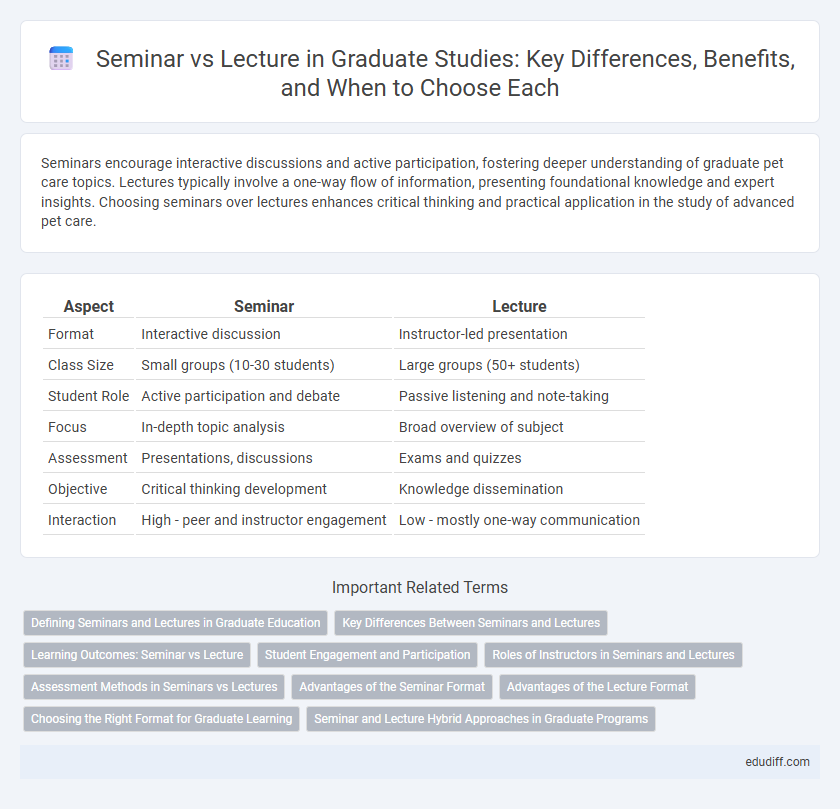Seminars encourage interactive discussions and active participation, fostering deeper understanding of graduate pet care topics. Lectures typically involve a one-way flow of information, presenting foundational knowledge and expert insights. Choosing seminars over lectures enhances critical thinking and practical application in the study of advanced pet care.
Table of Comparison
| Aspect | Seminar | Lecture |
|---|---|---|
| Format | Interactive discussion | Instructor-led presentation |
| Class Size | Small groups (10-30 students) | Large groups (50+ students) |
| Student Role | Active participation and debate | Passive listening and note-taking |
| Focus | In-depth topic analysis | Broad overview of subject |
| Assessment | Presentations, discussions | Exams and quizzes |
| Objective | Critical thinking development | Knowledge dissemination |
| Interaction | High - peer and instructor engagement | Low - mostly one-way communication |
Defining Seminars and Lectures in Graduate Education
Seminars in graduate education emphasize interactive discussions, critical thinking, and in-depth analysis of specialized topics, fostering active student participation and collaboration. Lectures primarily involve structured presentations delivered by professors to convey foundational knowledge and complex theories, often with limited direct student engagement. The distinction lies in seminars promoting dialogue and exploration, whereas lectures focus on content delivery and conceptual understanding.
Key Differences Between Seminars and Lectures
Seminars emphasize interactive discussions and active student participation, allowing for in-depth exploration of topics with peer and instructor feedback. Lectures primarily involve one-way communication where the instructor delivers structured content to a larger audience, focusing on information dissemination. Graduate seminars often require critical analysis and presentation skills, whereas lectures prioritize foundational knowledge acquisition.
Learning Outcomes: Seminar vs Lecture
Seminars foster active learning and critical thinking by promoting student participation, discussion, and collaborative problem-solving, which enhances deeper understanding and retention of knowledge. Lectures primarily deliver structured content from the instructor to students, focusing on information transmission and foundational knowledge acquisition. Learning outcomes in seminars often include improved analytical skills and engagement, while lectures emphasize content comprehension and note-taking abilities.
Student Engagement and Participation
Seminars promote higher student engagement and active participation through interactive discussions, collaborative activities, and critical thinking exercises. Lectures typically involve one-way communication, limiting opportunities for students to ask questions or contribute, which can reduce overall involvement. Graduate students in seminars benefit from deeper comprehension and practical application by actively engaging with the material and peers.
Roles of Instructors in Seminars and Lectures
In seminars, instructors act as facilitators who guide interactive discussions and encourage critical thinking among graduate students, promoting collaborative learning and deeper engagement with the material. In lectures, instructors primarily serve as knowledge transmitters, delivering structured content to a larger audience with an emphasis on clarity and comprehensive coverage of complex topics. The differing roles reflect the pedagogical objectives of seminars, centered on active participation, versus lectures, focused on efficient information delivery.
Assessment Methods in Seminars vs Lectures
Assessment methods in seminars typically emphasize active participation, critical thinking, and collaborative projects, enabling graduate students to demonstrate their understanding through discussions and presentations. In contrast, lectures often rely on traditional assessments like exams and quizzes that evaluate individual knowledge retention and comprehension. Seminars foster deeper analytical skills and real-time feedback, whereas lectures prioritize content delivery and standardized testing.
Advantages of the Seminar Format
Seminars promote active learning by encouraging graduate students to engage in discussions, ask questions, and critically analyze topics with peers and instructors. The smaller group setting fosters personalized feedback and deeper exploration of complex subjects, enhancing comprehension and retention. Enhanced collaboration and networking opportunities within seminars contribute to professional development and academic growth.
Advantages of the Lecture Format
Lecture format offers a structured learning environment where graduate students receive comprehensive content delivery from expert professors, facilitating efficient knowledge acquisition. This format allows for real-time clarification of complex concepts and immediate feedback, enhancing academic understanding. Large lecture settings also enable access to diverse perspectives through student questions and professor insights, promoting critical thinking and engagement.
Choosing the Right Format for Graduate Learning
Graduate students benefit from seminars by engaging in interactive discussions that deepen critical thinking and foster collaborative learning, while lectures efficiently convey complex theoretical frameworks and foundational knowledge from expert faculty. Selecting the appropriate format depends on the learning objective: seminars excel in developing analytical skills and peer feedback, whereas lectures are ideal for delivering structured content and extensive subject coverage. Tailoring the educational approach enhances mastery of advanced topics and supports diverse graduate research methodologies.
Seminar and Lecture Hybrid Approaches in Graduate Programs
Seminar and lecture hybrid approaches in graduate programs combine interactive discussions with structured content delivery, enhancing critical thinking and in-depth understanding. Seminars encourage active student participation and peer collaboration, while lectures provide foundational knowledge and systematic coverage of complex topics. This blended format optimizes learning outcomes by balancing theoretical frameworks with practical applications in advanced academic settings.
Seminar vs Lecture Infographic

 edudiff.com
edudiff.com